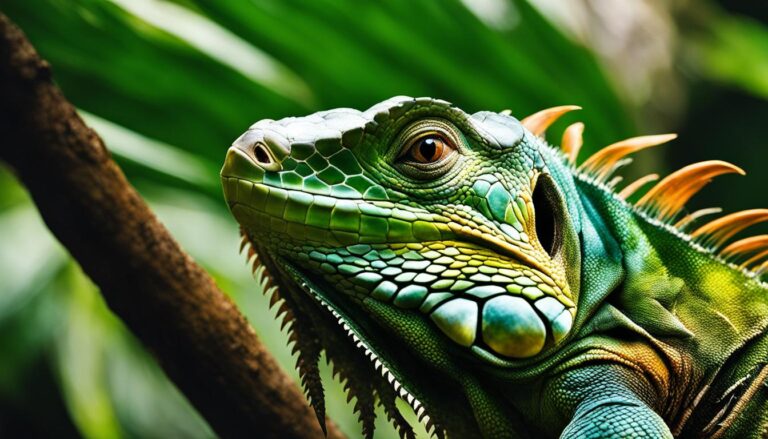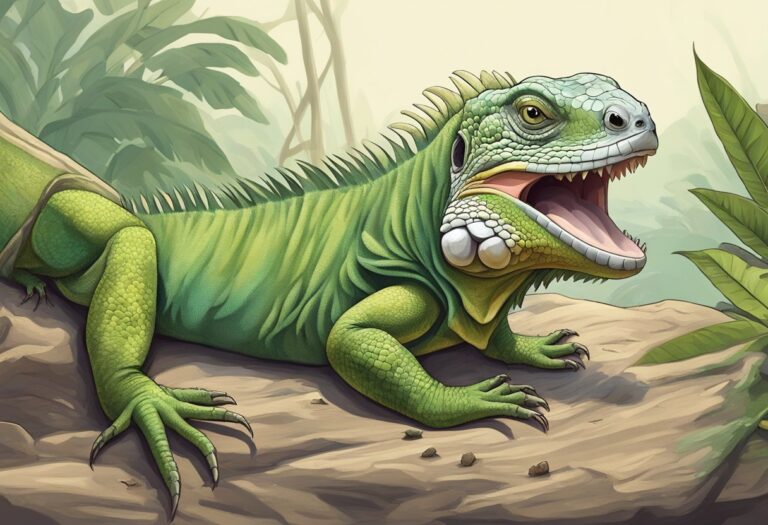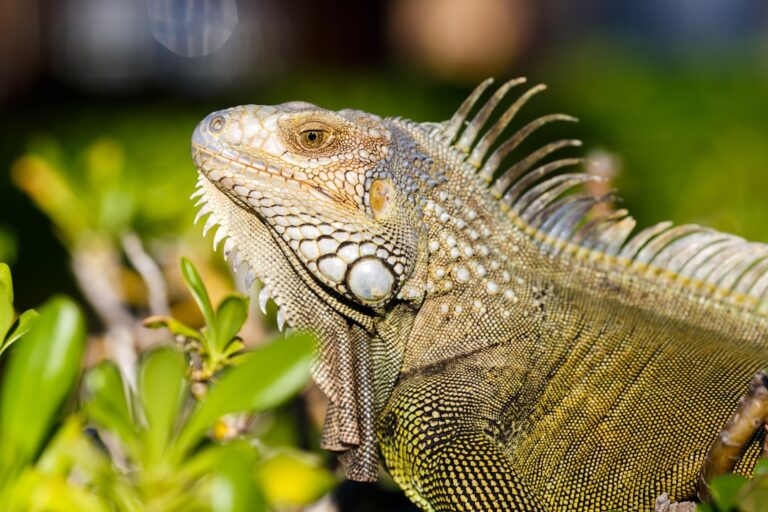Do Iguana Bites Hurt?
Iguanas are fascinating reptiles known for their unique appearance and behavior. They are native to tropical regions and are often kept as pets due to their docile nature. However, it is important to understand their behavior in order to prevent bites. Iguanas have the potential to become aggressive if they feel threatened or stressed, and their bites can cause serious injury. By understanding iguana behavior and taking appropriate precautions, we can ensure a safe and enjoyable interaction with these reptiles.
Table of Contents
Understanding Iguana Behavior: Why They Bite
There are several factors that can contribute to iguana aggression. One of the main reasons is fear or feeling threatened. Iguanas have a natural instinct to defend themselves when they perceive danger. This can be triggered by sudden movements, loud noises, or being cornered. Additionally, iguanas may become territorial and aggressive towards other animals or humans if they feel their space is being invaded.
It is important to be able to recognize the signs of an agitated iguana in order to avoid triggering aggressive behavior. Some common signs include hissing, puffing up their body, whipping their tail, and opening their mouth wide. These behaviors indicate that the iguana is feeling threatened and may bite if further provoked.
To avoid triggering aggressive behavior in iguanas, it is important to approach them calmly and slowly. Sudden movements or loud noises can startle them and cause them to become defensive. It is also important to give them plenty of space and avoid cornering them. By respecting their boundaries and allowing them to feel safe, we can minimize the risk of being bitten.
The Anatomy of an Iguana Bite: What Happens When They Bite
Iguanas have sharp teeth and powerful jaws that they use for biting. Their teeth are designed for tearing vegetation, but they can still cause significant damage if they bite a human. Iguanas have rows of small, serrated teeth that can easily puncture the skin. Their jaws have a strong grip, allowing them to hold on tightly when they bite.
When an iguana bites, it can cause puncture wounds and lacerations. The severity of the bite depends on the size and strength of the iguana, as well as the force with which it bites. In some cases, an iguana bite can result in deep tissue damage and may require medical attention.
How Painful is an Iguana Bite? A Comparative Analysis
Comparing the pain of an iguana bite to other animal bites can provide some perspective. While an iguana bite is not typically as painful as a bite from a larger animal such as a dog or a cat, it can still cause discomfort and injury. The pain experienced from an iguana bite can vary depending on the individual’s pain tolerance and the severity of the bite.
Factors that can affect the severity of an iguana bite include the size and strength of the iguana, as well as the location of the bite. Bites to sensitive areas such as the hands or face may be more painful than bites to less sensitive areas. Additionally, if an iguana bite becomes infected, it can cause additional pain and complications.
Personal accounts of iguana bite pain vary. Some individuals describe the pain as sharp and intense, while others report a dull ache or throbbing sensation. It is important to note that everyone’s experience with pain is subjective, and what may be painful for one person may not be as painful for another.
Iguana Bite Symptoms: What to Look Out for After Being Bitten
After being bitten by an iguana, there are several common symptoms to look out for. These include pain, swelling, redness, and bleeding at the site of the bite. In some cases, the bite may also cause bruising or blistering. It is important to clean the wound thoroughly to prevent infection.
Infection is a potential complication of an iguana bite. Signs of infection include increased pain, swelling, redness, warmth, and pus or discharge from the wound. If these symptoms occur, it is important to seek medical attention as soon as possible. In severe cases, an untreated infection can lead to more serious health problems.
If you have been bitten by an iguana and are unsure whether or not the bite is infected, it is always best to err on the side of caution and seek medical attention. A healthcare professional can evaluate the wound and provide appropriate treatment if necessary.
Common Misconceptions About Iguana Bites
There are several misconceptions about iguana bites that need to be clarified. One common misconception is that all iguanas are aggressive and will bite if given the opportunity. While it is true that iguanas have the potential to become aggressive if they feel threatened, not all iguanas will bite. Many iguanas are docile and can be safely handled with proper care and respect.
Another misconception is that all iguana bites are venomous. Iguanas do not possess venom glands, so their bites are not venomous. However, as mentioned earlier, their bites can still cause injury and potential complications if not properly treated.
It is also important to note that not all iguana bites require medical attention. Minor bites that do not break the skin or cause significant injury can often be treated at home with basic first aid measures. However, if there is any doubt about the severity of the bite or if there are signs of infection, it is always best to seek professional medical attention.
First Aid for Iguana Bites: What You Should Do
If you have been bitten by an iguana, it is important to take immediate action to prevent infection and promote healing. Here is a step-by-step guide to treating an iguana bite:
1. Clean the wound: Use mild soap and warm water to clean the bite wound. Gently remove any dirt or debris from the area.
2. Apply pressure: If the bite is bleeding, apply gentle pressure with a clean cloth or bandage to stop the bleeding.
3. Apply an antiseptic: After cleaning the wound, apply an antiseptic ointment to help prevent infection. This can be purchased over-the-counter at a pharmacy.
4. Cover the wound: Once the antiseptic ointment has been applied, cover the wound with a sterile bandage or dressing. This will help protect the wound from further contamination.
5. Monitor for signs of infection: Keep an eye on the bite wound for any signs of infection, such as increased pain, swelling, redness, or discharge. If these symptoms occur, seek medical attention.
If an iguana bite becomes infected, it is important to seek professional medical attention. In some cases, oral antibiotics may be prescribed to treat the infection. It is important to follow all instructions provided by a healthcare professional and complete the full course of antibiotics to ensure that the infection is fully treated.
Preventing Iguana Bites: Tips for Avoiding Aggressive Behavior
Preventing iguana bites starts with understanding their behavior and taking appropriate precautions. Here are some tips for safely interacting with iguanas and avoiding aggressive behavior:
1. Approach calmly and slowly: When approaching an iguana, do so calmly and slowly. Sudden movements or loud noises can startle them and cause them to become defensive.
2. Give them space: Iguanas need their personal space, so it is important to give them plenty of room to move around. Avoid cornering them or trapping them in a confined space.
3. Respect their boundaries: Iguanas have their own territory, and they can become aggressive if they feel it is being invaded. Avoid reaching into their enclosure without their permission and do not try to handle them if they are showing signs of aggression.
4. Use proper handling techniques: If you need to handle an iguana, it is important to use proper techniques to minimize the risk of being bitten. Support their body with both hands and avoid grabbing or squeezing them.
5. Create a safe environment: If you have an iguana as a pet, it is important to create a safe and comfortable environment for them. This includes providing appropriate housing, temperature, and humidity levels, as well as a proper diet.
By following these tips and respecting the natural behavior of iguanas, you can minimize the risk of being bitten and ensure a safe interaction with these reptiles.
What to Expect During Iguana Bite Treatment
If you seek professional medical attention for an iguana bite, there are several things you can expect during the treatment process. The healthcare professional will evaluate the bite wound and determine the appropriate course of treatment based on the severity of the injury and the presence of any infection.
In some cases, an X-ray may be ordered to assess for any underlying damage to bones or tissues. If there is evidence of infection, a sample may be taken from the wound for laboratory testing to determine the appropriate antibiotic treatment.
Treatment for an iguana bite may include cleaning the wound, applying antibiotic ointment, and covering it with a sterile dressing. In some cases, oral antibiotics may be prescribed to prevent or treat infection. Pain medication may also be prescribed to manage any discomfort associated with the bite.
It is important to follow all instructions provided by the healthcare professional and attend any follow-up appointments as scheduled. This will ensure that the bite wound is properly treated and monitored for any signs of complications.
Coping with the Emotional Aftermath of an Iguana Bite
Being bitten by an iguana can be a traumatic experience, and it is important to address the emotional impact of the bite. Some individuals may experience feelings of fear, anxiety, or even post-traumatic stress disorder (PTSD) following an iguana bite.
To cope with the emotional aftermath of an iguana bite, it can be helpful to talk to a trusted friend or family member about your experience. Sharing your feelings and fears can provide a sense of relief and support. It may also be beneficial to seek professional help from a therapist or counselor who can provide guidance and support in processing the emotions associated with the bite.
Engaging in stress-reducing activities such as deep breathing exercises, meditation, or yoga can also help manage anxiety and promote relaxation. Taking care of your physical health by eating well, getting regular exercise, and getting enough sleep can also contribute to overall well-being.
It is important to remember that everyone copes with traumatic experiences differently, and there is no right or wrong way to feel. Give yourself time and space to heal emotionally, and reach out for support when needed.
Iguana Bite Risks: When to Seek Professional Medical Attention
While not all iguana bites require professional medical attention, there are certain signs that indicate the need for immediate medical care. These include:
1. Deep puncture wounds: If the bite has caused deep puncture wounds or lacerations, it is important to seek medical attention. These types of wounds may require stitches or other interventions to promote proper healing.
2. Excessive bleeding: If the bite is causing excessive bleeding that cannot be controlled with direct pressure, it is important to seek medical attention. Excessive bleeding may indicate damage to blood vessels or other underlying structures.
3. Signs of infection: If the bite wound becomes red, swollen, warm to the touch, or starts to discharge pus, it is important to seek medical attention. These are signs of infection and may require treatment with antibiotics.
4. Severe pain: If the bite is causing severe pain that is not relieved with over-the-counter pain medication, it is important to seek medical attention. Severe pain may indicate underlying damage or infection.
5. Signs of systemic illness: If you develop symptoms such as fever, chills, nausea, or vomiting after an iguana bite, it is important to seek medical attention. These symptoms may indicate a more serious infection or other complications.
It is always better to err on the side of caution and seek medical attention if there is any doubt about the severity of the bite or if there are signs of infection or other complications.
Understanding iguana behavior and taking appropriate precautions can help prevent bites and ensure a safe interaction with these reptiles. By recognizing the signs of an agitated iguana and avoiding triggering aggressive behavior, we can minimize the risk of being bitten. If a bite does occur, it is important to clean the wound thoroughly and monitor for signs of infection. Seeking professional medical attention when necessary can help prevent complications and promote proper healing. By following these guidelines and respecting the natural behavior of iguanas, we can enjoy a safe and enjoyable interaction with these fascinating reptiles.
If you’re curious about the behavior of iguanas, you might also be interested in learning why do iguanas turn black. This fascinating article on Reptile Friend explores the reasons behind this color change and provides insights into the behavior of these reptiles. Discover the secrets behind this intriguing phenomenon by clicking here.







